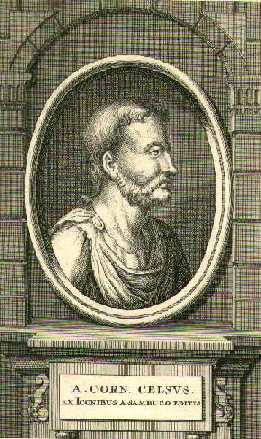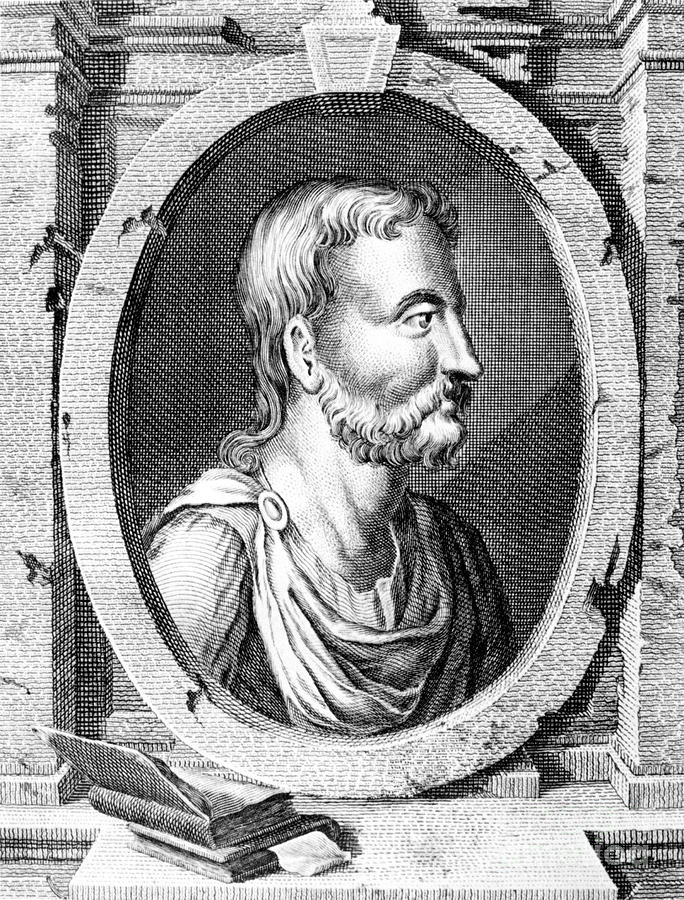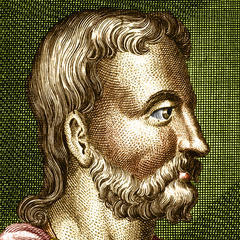Celsus
Celsus (Greek Κέλσος Kelso, Latin Celsus ) was an ancient philosopher ( Platonist ) in the second half of the 2nd century AD He wrote the oldest known polemic against Christianity. Their text is not preserved, but can be reconstructed from numerous traditional quotes partly because many Christian writers apart sat with her. Kelso had detailed knowledge about the Bible, he knew the Christian teachings and the differences of the various Christian groups with one another. He regarded Christianity as a corruption of the Jewish religion and threw the Christians in particular, their segregation from the social structure before; he held the existence of such a foreign body in the state and society for disastrous.
Life
News about Celsus ' origin and life are not known. Attempts to identify him with a person otherwise known, have not led to convincing results.
Work
His polemic against Christianity entitled Alethes lógos ( λόγος ΆληΘής, "True doctrine " ) was probably built around 175, probably in Alexandria. The original text is not preserved, but the work can be reconstructed from the quotations in an authored around 248 refutation of church writer Origen partially. The also written in Greek script of Origen is titled Against the writing of Celsus, entitled "True doctrine " (in short: Against Celsus, latin Contra Celsum ). Since Origen cites a section at a time and tries to refute, can be inferred approximately from its representation and the construction of the Alethes logos. Although it claims Origen, to be received on all the arguments of the opponent, but, the opinions of researchers about how great the narrated from him text component, is far apart. At the latest after the elevation of Christianity as the state religion of all remaining copies have been destroyed. Whether and to what extent except Origen have known and used the work of other authors is debatable; clear evidence is lacking.
Under the " true doctrine " to which the title of the document relates, Kelso understands an initial, the oldest peoples and in particular their wisdom teachers originally common religious- philosophical knowledge. He cites several peoples, including the Egyptians, Assyrians, Chaldeans, Indians and Persians. Among the ways that had the true doctrine in his opinion, it shall make Homer, Orpheus, Pherecydes of Syros, Pythagoras and Zoroaster ( " Zoroastres " ) to. Plato was from Celsus ' view not the creator of a new philosophy, but only a great preacher of the old traditional universal wisdom. This view of the history of philosophy was not a peculiarity of Kelso; she was about to be supported by Numenius, who counted as Kelso for Mittelplatonismus, and later was the common property of late antiquity Neoplatonists.
To the Jews and the Christians raises Kelso ago, they had deviated from innovatory and craving of the common ancient wisdom of the people and had misguided teachings introduced, but nothing really new are, but emerged only from mangelhaftem understanding distortions of the old common knowledge of the wise. Thus they would have disturbed the original harmony and sowed discord. Their teachings originated partly from the knowledge of the Egyptians and the Persians, sometimes they had it from Greek sources - especially Homer and Plato - drawn and thereby distorts the truth. With its special path, the Christians had made outside the community of mankind. Due to their exclusivity awareness, their belief in their uniqueness and their hostile attitude towards all other religions and cults in particular the state they would have broken away from the national community. Therefore, they are not loyal citizens of the Empire, but presented with their subversive attitude a threat to its continued existence dar. With his fierce polemic against Christianity but Celsus applies not only to supporters, but also to Christians he intends dissuade them from their faith. His polemic is also teaching writing and advertising literature.
Kelso was well informed about both Judaism and of Christianity of his day, which he relied on oral and written sources. He knew the Old Testament as his references to the story of creation, the Flood and the story of the biblical Patriarchs and point to the concept of prophethood and especially Jonah and Daniel. All four Gospels and the teachings of the Apostle Paul were familiar to him. Even with the numerous special Christian communities whose followers were opposed by the church as a heretic, he knew his stuff and differed between their teachings. He knew about their disputes among themselves and with the Church, which he described as " Great Church " decision, as well as about the Jewish polemic against the Christians. His renderings of opposites advantage for his argument; so he let a Jew occur, the polemic against Jesus first, then against the Jewish Christians. The division of Christendom into a wealth regarded by sectarian Special Communities Kelso as a decay process that had begun with the isolation of the Jews from the Egyptians, then continued from Judaism to the separation of Christianity and eventually necessarily einmündete in the fragmentation among Christians.
One of the arguments of Celsus, with whom he fought against Christianity and single Christian teachings include the following:
- It is absurd to believe that the supreme deity issued in a human body, even to a normal and unremarkable, which one does not consider the Divine, and that God intermittent with evil and ugliness abgebe and suffering. In addition, it was not apparent that God had done only at a certain time and not earlier.
- It is foolish to believe that God take care of the Jews and the Christians more than the rest of the world and only to them was sending his messengers. Also could imagine worms or frogs, that the universe exists because of them and that God will prefer over all other beings.
- If all people would like the former Christians refuse to participate in the political community, the kingdom must perish; then barbarians would take power and destroy any civilization and wisdom. Then finally would remain nothing left also from Christianity.
- The linear, eschatological understanding of history Christians is Celsus against a cyclical interpretation of history. He is convinced that the story does not aspire to an end point such as the doomsday and the Last Judgement, but is an eternal cycle.
- There is no reason to assume that the world was created for man's sake. Rather, one could even say it is because for the sake of the animals. Although the animals are hunted and eaten by humans, but the converse may come before and had earlier - before the people weapons, nets and hunting dogs introduced - even been the norm. Therefore, God seems rather to have the predators preferred because it already sent along them their weapons. In reality, the world is a totality; it was not one of its parts the sake of another, or as a genus of beings created for another, but each part consists directly in terms of the whole.
- It is a contradiction that Jesus is called the son of a carpenter, while his pedigree is traced back to the Jewish kings.
- Jesus threaten and scold because he was unable to convince.
- The Christians were uneducated and did not consider this as a defect, but as if it were a merit. They felt that a uneducated have better access to the truth than an educated.
- It is absurd to suppose that God was unable to convince his own creation, Adam.
- It is ridiculous to attribute to God human passions like anger.
- The doctrine of the resurrection of the flesh, insinuating a natural anti- God and foolish behavior.
- It is absurd to suppose that God did after the six days' work of creation needs a day off, as he would like a craftsman tired after work.
- It is not made clear why one should believe, but faith will simply demanded as a condition for salvation.
- The devil faith, so the idea that God had an adversary, was a sign of the utmost ignorance. If there was the devil and he had deceived the people, there would be no reason for God to threaten the dupes; ever threatened anyone God.
Religious Philosophy
Origen apparently knew about Kelso and his views are not more than what he could refer to Alethes logos. He tried erroneously the Platonist Celsus, against whom he applied to identify with the same- Epicureans, but gave this respect, its uncertainty. The term " Epicurean " was then often used as an epithet for a philosophical opponents.
Kelso's disposal, as shown by its knowledgeable explanations, an excellent education, which he also presupposed that his readers. In mythology and drama he knew her as well as in rhetoric and philosophy. His religious and philosophical ideas were in line with the Mittelplatonismus his time. He took on a transcendent, immutable and formless " top " or " first " God, in which he saw the cause of the nous and of being ( ousia ). This is the God he thought was not immediately obvious, but one could open up its existence indirectly. He stressed that the supreme god had neither a name nor a unit of a certain mode of being; one should thus do not attribute properties. For Kelso God was only negatively determined.
The other gods are in Celsus ' hierarchical view of the world at a lower level. They are acting, the supreme deity subordinate beings who are active to preserve the world order, as the supreme God, the eternally unchangeable, change and thus any activity is foreign. These gods prove to the people with the right proper ritual worship, and the gods call themselves benevolently the pious people, for instance by give them oracles or grant them healing of suffering. Individual gods are assigned to certain ethnic and geographic responsibilities within the context of world order, they are popular deities or local deities. This gives the meaning and justification of various religious cults and customs.
The matter considered Kelso as not created by God, but eternal; So far as he is a dualist. The material world has neither a beginning nor an end time, but each individual material object is transient for him.
Editions and translations
- Marcel Borret (ed.): Origène: Contre Celse. 5 volumes, Les Éditions du Cerf, Paris 1967-1976 (Greek text with French translation )
- Miroslav Marcovich (ed.): Origen: Contra Celsum libri VIII Brill, Leiden 2001, ISBN 90-04-11976-0 ( authoritative critical edition )
- Horacio E. Lona: The " True Doctrine " of Celsus. Herder, Freiburg 2005, ISBN 3-451-28599-1 ( German translation with detailed commentary )










